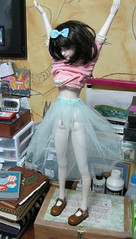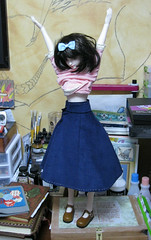If you’re a writer, you probably know how easy constructing a tale can be. You start in one place, and before you know it you’re flying along, picking up bits of plot and pasting them to the moving storyline. It’s a bit like a scene from this Wallace and Gromit movie I used to watch when I was a kid, “The Wrong Trousers”, where Gromit has to build the tracks of a toy train as he’s riding it to keep from being de-railed. It’s pretty panic-inducing, but it’s easy enough; the pieces fit and you can always turn if you’re going to hit a wall.
I haven’t written in my blog for a long while now, and part of the reason for that was a need for a break from writing. I thought I had completed my novel; I even started sending queries to agents. I realized it needed some tweaking, so I pulled it aside and went back to work. Then came the mutation.
I’ve always gone the “building the train tracks as you go” route as far as plotting is concerned. I never saw the relative ease as a warning sign; I thought it was more muse-inspired and just rolled with it. Recently, however, I decided to write a short story as a birthday present to a dear friend of mine. I’m not used to short stories (barring school assignments), and the brevity of the tale forced me to see something which my full-length novels never have. That story didn’t breathe, it didn’t speak, and it certainly didn’t dance. It nodded blithely to the passerby as it lumbered on its way. It honestly made me want to fall asleep.
So I went back to the plotline, and wherever I came to a spot where it “felt” like something should happen, I mixed it up. More perilous detours in the way of the protaganist’s goal, more unpredictability and more mind-blowing (or at least ear-perking) plot twists. In the end, I had a fantastic story.
After this, I finally understood what had become of the book I actually wish to publish. Because, you see, when I first decided to tweak it, I made a small adjustment to the plot as well. And then everything erupted into madness.
Chapters that had been in the beginning moved to the end; characters’ motives multiplied alarmingly (I swear they were breeding); new twists and dark alleyways disrupted the straight train tracks of the plot; and everybody in the story felt so deeply, and expressed it so uniquely. I thought before that I knew what good characters were about. I had been gravely mistaken.
After recovering from the shock of watching my neat, abstract story multiply and evolve into some surreal, throbbing monstrosity, I felt mostly fatigue. “What, now I have to write all THIS?” And then I sulked.
But after writing the plot for that short story (which, by the way, I never even wrote), I realized I had no reason to despair. My story had simply come alive, broken the confines of its easy plot and grown into a conceivable series of events, happening to conceivable people. Real life is wrought with twists and perils, motives and detours, and no story—perhaps especially fantasy—can feel human without it. I wanted to craft a beautifully smooth plot, something concise and clever. But my life is filled with cracks and rubble. How could a character’s life feel realistic—much less sympathetic—if the path on which they walk’s main feature is aestheticism?



